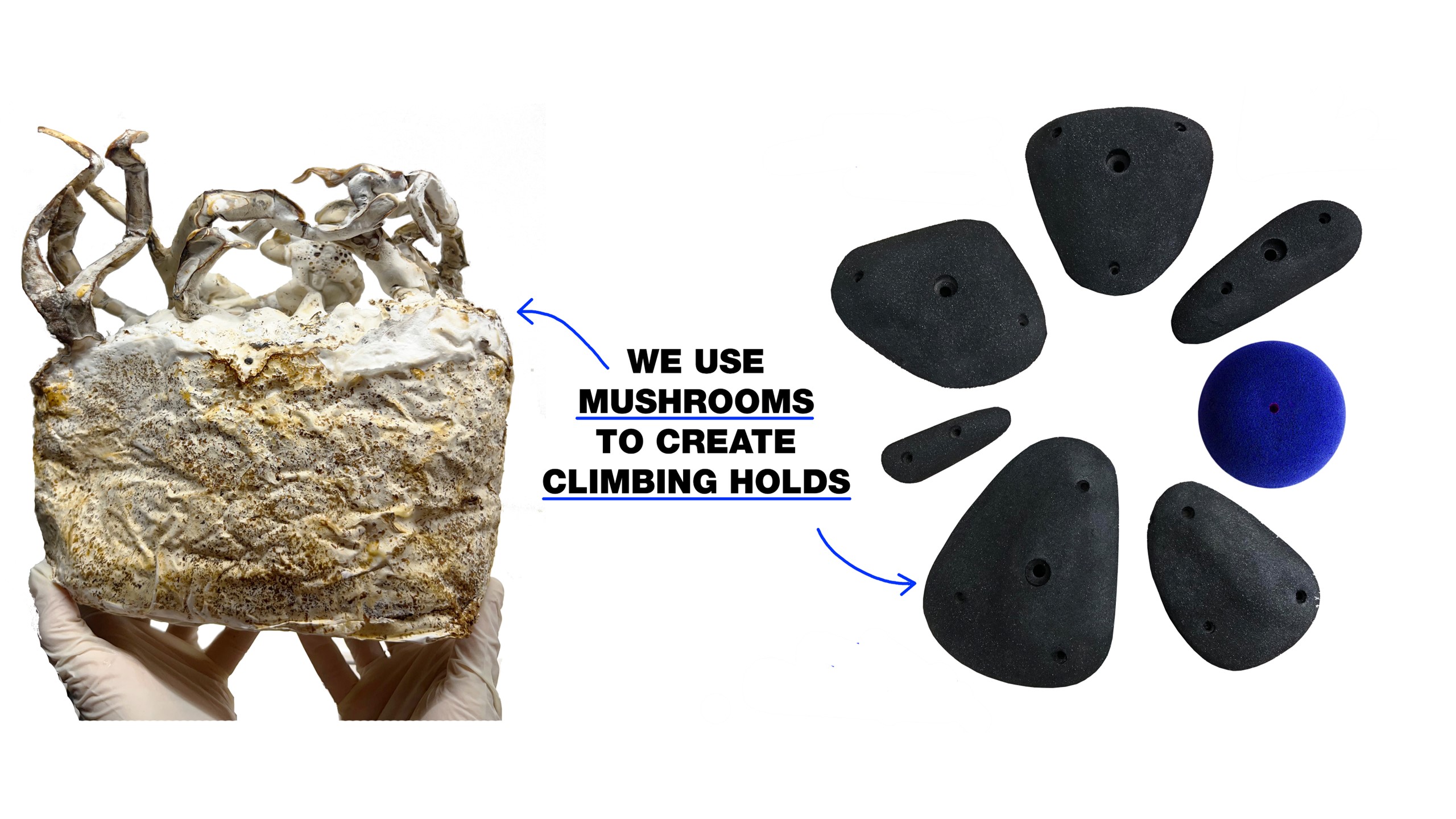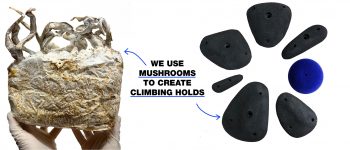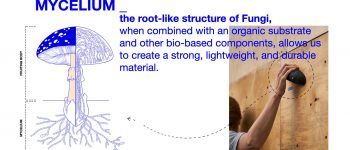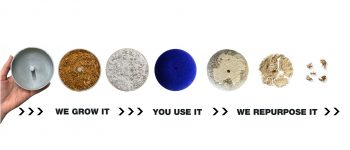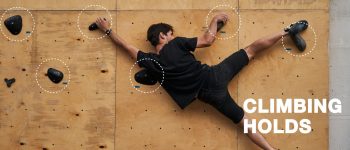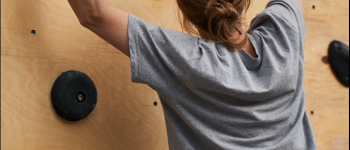WHAT WE DO AND HOW WE DO IT
MAD addresses the dual challenges of plastic production and waste in the climbing industry with its mycelium based composite material. Mycelium, the root-like structure of mushrooms, acts as a natural binder when combined with an organic substrate. By integrating additional bio-based materials, we refine and optimize the recipe to create high-performance, eco-friendly climbing holds with outstanding properties.
● 100% Biodegradability and Recyclability : Mycelium decomposes naturally, leaving no harmful residue and reducing waste management concerns for gyms.
● Lightweight Advantage : Mycelium holds are up to 50% lighter than traditional plastic holds, improving handling for route setters.
● Significantly Lower carbon footprint: The production of mycelium requires less energy and emits fewer greenhouse gases compared to traditional plastic manufacturing.
Although we haven’t conducted a full Life Cycle Assessment (LCA) yet, we estimate a reduction of 2.75 kg of CO2 emissions by using mycelium instead of plastic for one climbing hold. The decision to manufacture mycelium-based climbing holds as our market entry project is grounded in a combination of:
● ecological considerations
● technical feasibility
● support and access of mycologist experts
● deep connection to the climbing community.
Given the climbing community’s deep connection to nature, there is strong interest and support for our mission to revolutionize the industry through renewable materials and circularity. With our innovative approach and growing network of partners, MAD is well-positioned to lead the climbing industry towards a more sustainable future.
While our first application is climbing holds, our broader vision is to revolutionize industries reliant on durable plastics. MAD is set to redefine sustainable materials by developing a mycelium-based composite, combined with other bio-based components, that offers a high-performance alternative to plastics. This innovation has the potential to replace plastics across a wide range of applications, giving MAD a unique competitive edge in the growing market for sustainable materials.
ADJUSTMENTS FOR THE SGDs
Having all this in mind we are a perfect example of how sustainable innovation can align with the United Nations Sustainable Development Goals (SDGs).
Specifically, we can contribute to goals such as Goal 9 (Industry, Innovation, and Infrastructure), Goal 12 (Responsible Consumption and Production) and Goal 13 (Climate Action). We can confidently suggest the following adjustments and changes to be done in order to achieve the SDGs by 2050.
Regarding SDG 9: Industry, innovation and infrastructure
● Pioneering a new wave of bio-based industrial solutions. In this case introducing mycelium as a high-performance, eco-friendly alternative to traditional materials.
● Commit to green manufacturing processes; as an example by developing scalable, energy-efficient production techniques for mycelium-based products.
● Generate a collaborative ecosystem where knowledge sharing is encouraged to inspire broader adoption across industries.
Regarding SDG 12 (Responsible Consumption and Production)
● By replacing non-recyclable plastics like PU and PE with mycelium-based biodegradable materials we will be able to reduce the reliance on fossil fuel-derived materials, promoting circular production.
● Implementing take-back programs to recycle or compost mycelium-based materials will reduce landfill. Plus creating fully biodegradable products we will enable a closed-loop system where no harmful residues are left behind.
● By scaling responsible practices it will be possible to inspire other industries to adopt similar material innovations for products like packaging, furniture and construction.
Regarding SDG 13 (Responsible Consumption and Production)
● By promoting low-carbon alternatives we will be able to shift the industry standard towards sustainable materials. Decreasing reliance on carbon-intensive plastic production.
● Mycelium is a perfect example for that. Its production has significantly lower energy requirements and CO2 emissions compared to plastic manufacturing.
● We need to inspire climate-conscious behavior
CURRENT STAGE OF OUR DEVELOPMENT
Since November 2023, we have been experimenting with different recipes and combinations to enhance the properties of our mycelium-based materials while growing prototypes of climbing holds and refining the production process.
This early progress has already attracted significant attention within the climbing industry, demonstrating the need for and interest in our solution. Positive feedback from key industry players, including climbing hold brands and gym owners, underscores the demand for sustainable alternatives.
We are currently at TRL 4 – Technology Validation, with the following focus areas:
● Growing mycelium on different substrates and experimenting with material combinations.
● Testing for durability, strength, and performance.
● Evaluating growth and material compatibility across various recipes.
● Testing coatings to enhance functionality and durability. Significant progress is being made toward optimizing recipes and conducting preliminary evaluations of material performance.
This progress will enable us to select the best recipes to advance to TRL 5 – Technology Demonstration . We are eager to continue development and take the next steps toward scaling our solution.
THE RIGHT TIME TO TACKLE THIS PROBLEM
We are entering the climbing market at a pivotal moment. With over 20 million climbing holds produced annually—mostly from non-recyclable plastics like PU or PE—the industry faces a growing environmental challenge. While the market is expected to reach $600 million by 2030, the contradiction between the climbing community’s environmental values and the industry’s reliance on plastic holds is clear.
At the same time, growing regulatory pressures, like the Anti-Waste Law for a Circular Economy (AGEC), are accelerating the demand for sustainable solutions, creating a unique opportunity for disruption. Our biodegradable mycelium-based material directly addresses this need.
Early traction validates our approach: at the Vertical Pro Fair 2024, we showcased our mycelium-based material and leading brands like Blocz, Flathold, and Cheeta expressed strong interest in transitioning to our material.
In conversations with Blocz, they have already committed to purchasing 2,000 climbing holds per month once the product is ready, translating to €180,000 in monthly revenue from a single brand. We are also actively negotiating with other major players like Flathold and Cheeta. Capturing orders from these three key brands alone in the first year could result in €540,000 in monthly revenue. This early interest from leading brands underscores the market potential of our solution and highlights the immediate demand for sustainable alternatives in the climbing industry.
To better understand and address the industry’s challenges, we conducted interviews with over 60 industry experts and stakeholders, including four climbing gym owners. As a result, we have signed LOIs with key partners, including Der Kegel, Boulderklub Kreuzberg, Blocz, and others, to pilot-test our products. At Boulderklub Kreuzberg, we set the first mycelium-based climbing holds route using our prototypes, marking a significant milestone in demonstrating the feasibility of our material. This achievement was also featured on BBC Click, the globally recognized technology show, showcasing our innovation to a wider audience.
OUR JOURNEY
Our journey began with a significant milestone: being selected for BeVisioneers , the Mercedes-Benz fellowship. Driven by our determination to prove our concept, we grew our first mycelium prototypes in our own bathroom, without any specialized equipment or tools—just pure enthusiasm and dedication!
These prototypes not only allowed us to test our hypotheses and gather crucial feedback but also led to the creation of a physical product that opened many doors:
● We were selected for the Hardtech Innovation Accelerator Program at MotionLab (Berlin), where we stood out among over 150 projects. This accelerator provided us with seven months of full-time focus on our idea, validating our concept, continuing prototyping, refining our pitch, and developing a proof of concept.
● In April 2024, we secured a €23,000 scholarship from BeVisioneers, a vital boost that accelerated our R&D and enabled us to explore innovative solutions with our material.
● We earned second place at the Hardtech Innovation Program , receiving a €3,500 prize . These successes have not only enhanced our credibility but also attracted potential customers and investors, with whom we are currently in discussions.
● Recently we won the pitch competition at Photonics Day in Berlin , getting recognized for our optimized mycelium-growth methods.
We are really excited and proud of our achieved milestones and we could not have made it without the immense support of BeVisioneers the Mercedes-Benz fellowship, our venture coach Iris Lapinski and Dr. Jose M. Brito Rosas, friend and serial founder.
● The global sports equipment market alone is valued at over €332 billion , with plastics accounting for a large share of the materials used
● There is a growing demand for innovation in materials that are not only sustainable but also enhance product performance through lighter weight, increased durability, and greater versatility
This is where we come in. Our innovative technology represents the future of materials—offering a transformative solution that reduces reliance on fossil fuels and addresses the environmental challenges posed by plastic. We are not just an option; we are shaping the path towards a more sustainable future by providing high-performance, eco-friendly alternatives.
From our perspective, there is a big opportunity provided by mycelium’s potential to replace plastics. While mycelium has gained traction in industries like packaging and textiles, its potential for durable applications, remains underexplored. Mycelium offers a viable, sustainable alternative due to its ability to be molded into strong, lightweight, and biodegradable materials.
OUR FIRST PRODUCT: CLIMBING HOLDS
One of the fastest-growing sports within the industry is climbing. Its popularity has surged due to its inclusion in the Olympics, the rise of indoor climbing gyms, and its appeal as both a physical and mental challenge. This rapid growth has boosted the climbing industry but also brought challenges that conflict with the environmental values upheld by the climbing community:
● Over 20 million climbing holds are produced for indoor and outdoor climbing each year globally.
● In Berlin alone, there are 28 gyms, 514 across Germany, and over 2,000 in the EU and USA.
This rapid growth and high demand, combined with the near-exclusive use of plastics, represents one of the industry's most pressing problems. For these reasons, we have selected the climbing holds industry as our initial target market.
We have partnered up with two Berlin local gyms, Boulder Klub Kreuzberg and Der Kegel where we are conducting user research tests with our product and we have 3 Loi’s from Cheeta,Flatholds and Blocz, that they would like to produce their products with our material as soon as it’s available.

